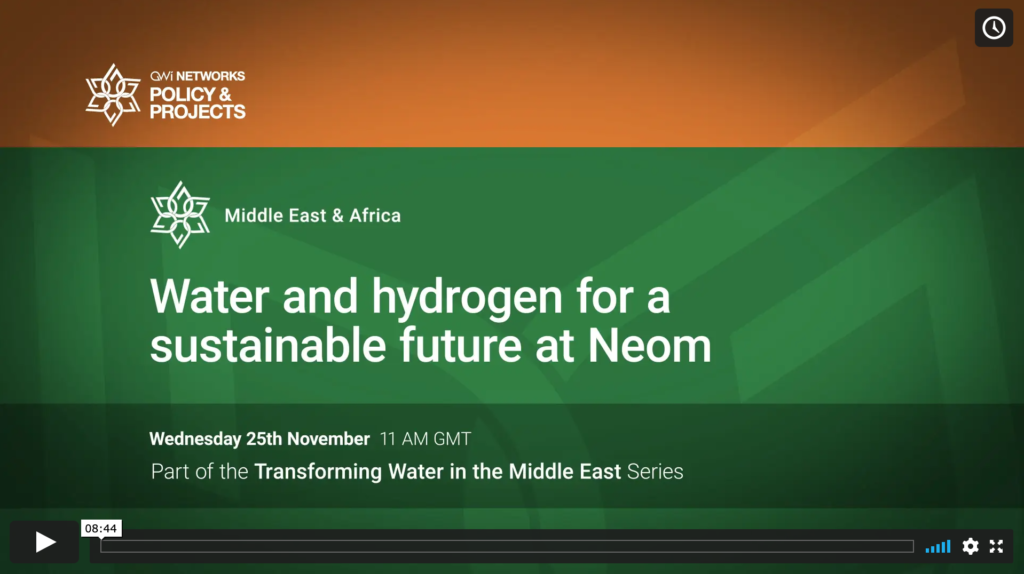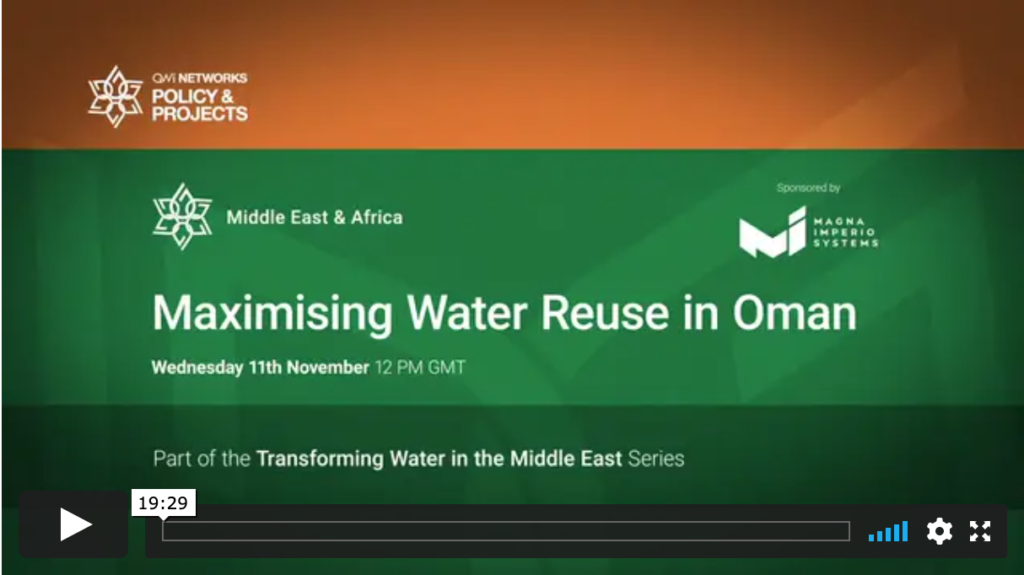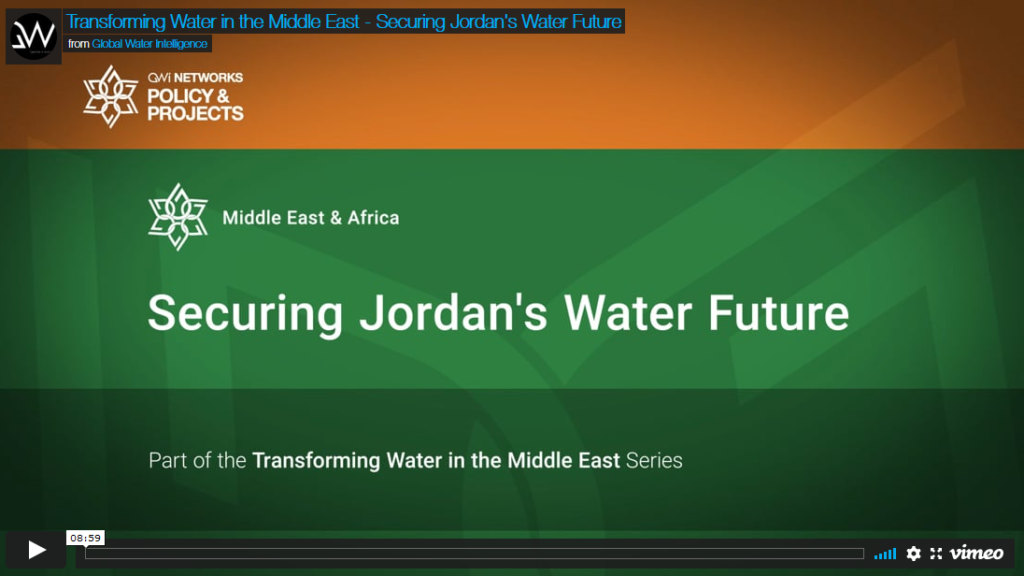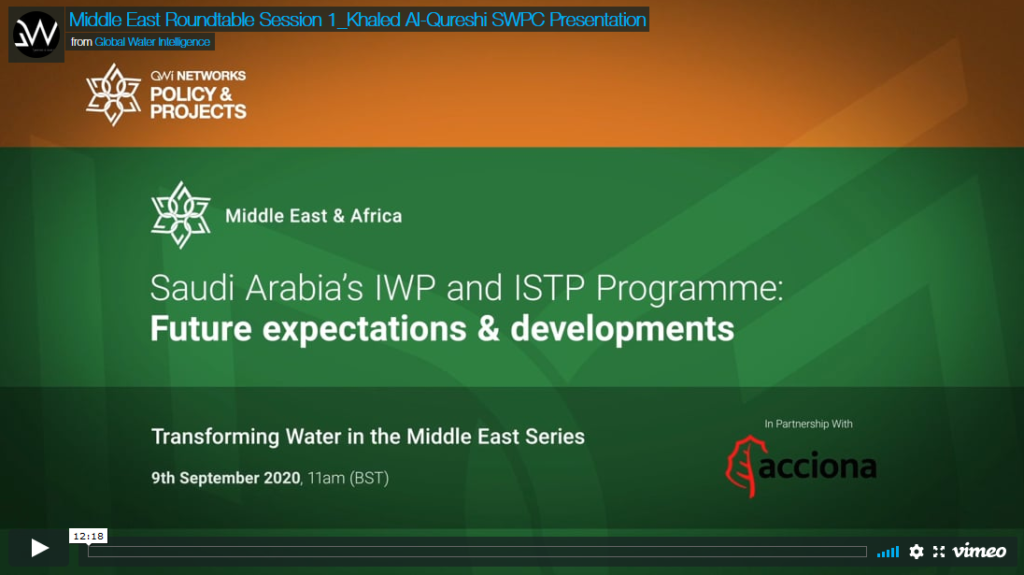Middle East & Africa
Events
Hosted by GWI’s Policy and Projects Network
Transforming Water in the Middle East Series
Sep 2020 – Nov 2020
Taking place fortnightly between September and November, the Transforming Water in the Middle East Series brought together key players involved in some of the most significant water and wastewater investment initiatives in the region.
The expertise of the international private sector will play a crucial role in addressing the water needs of the Middle Eastern region in facing down historic water scarcity brought on by an arid climate and aggravated by rapidly growing populations and shifting economic priorities. The region offers a highly competitive projects landscape which continues to be at the cutting edge of infrastructure developments at the intersection of water technology, innovative finance and energy. Forging collaborative networks will not only be vital in staying up to date with current affairs but also managing the shifting risk profile these opportunities present.
This initial series of six sessions aimed to enable project proponents to communicate their ambitions and expectations to potential partners, and for contractors, innovators and other suppliers to initiate the relationships they need for success in the region.
Click to navigate to past sessions in this series.
Past Sessions
25th November 2020
As investors look to capitalise on a growing demand for hydrogen fuel, Saudi Arabia’s Neom new city development has given the go-ahead for a $5 billion PPP project which will produce green hydrogen from desalinated seawater. These new developments signal not only the growing importance of water technologies in the future of the energy industry but a new dynamic to the water-energy nexus: one with renewable water and renewable energy working together to power growth without resource constraints.
Water Sector Head, Gavin Van Tonder, shares details of the project and process which will define the next steps in Neom’s strategy combining renewable energy with water, demonstrating new ways of managing utility supply using the latest in modern technology.
Facilitator
- Tom Scotney, Editor, Global Water Intelligence
Keynote Speaker
- Gavin Von Tonder, Water Sector Head, Neom
Panellists
- Thomas Altmann, Vice President, Innovation & Water Technology, ACWA Power
Session 5 - Maximising Water Reuse in Oman
11th November 2020
In partnership with:

Combined with economic strategies for diversification and development of further industrial zones, there will also be significant opportunities for upgrading, expanding and developing new wastewater and water reuse infrastructure for the industrial sector.
Facilitator
- Tom Scotney, Editor, Global Water Intelligence
Keynote Speaker
- Suleiman Khamis Al Qasmi, Acting Chief Executive Officer & General Manager, Haya Water, Oman
- Abdullah Al Hashimi, Project Director, Marafiq, Oman
Panellists
- Grant Page, Founder, Chairman & President, Magna Imperio Systems Corporation
Session 4 - Upgrading Saudi Arabia’s Wastewater Treatment Sector
27th October 2020
In partnership with:

Saudi Arabia’s National Water Company (NWC) has unveiled a programme that could see private investors and operators revolutionise the quality of the country’s network of wastewater treatment plants. With the launch of an updated request for qualifications for the long-term operation and maintenance (LTOM) of sewage treatment plants, the Kingdom’s largest STPs will be split into five regional packages that will be handed over to private operators for a period of 10-25 years.
Eng. Majed Al Ruwaili, General Manager Environmental Compliance & Wastewater Services of the National Water Company explains how this new approach to bringing private finance into state-owned wastewater treatment assets differs from previous plans and explains the next steps in stimulating private investment in the upgrading and enhancement of the Kingdom’s Water Treatment sector.
Facilitator
- Tom Scotney, Editor, Global Water Intelligence
Keynote Speaker
- Majed Al Ruwaili, General Manager Environmental Compliance & Wastewater Services, National Water Company, Saudi Arabia
Panellists
- Javier Diaz, KSA Country Manager, Aqualia
Session 3 - Securing Jordan's water future
7th October 2020
Jordan’s National Water Strategy 2016-2025 highlights the compound impacts of the climate, geography and the region’s geopolitical environment as key contributors to its extreme water scarcity.
While the shifting demographics of a national refugee crisis place unprecedented strain on water networks evidenced by increasing NRW rates, over-reliance on groundwater sources leave them at risk of depletion, pollution and saline intrusion.
While managing non-revenue water is a persistent focus within the Kingdom, the latest incarnation of a $1 billion desalination and transport scheme, the Aqaba-Amman Water Desalination and Conveyance Project, highlight that currently, seawater desalination remains a key factor in providing a meaningful and long-term answer to its pressing water crisis.
High-level representatives from the Ministry of Water and Irrigation (MWI), KfW and USAID discuss the repositioning of the Jordanian water sector and how the country is finding new approaches to funding infrastructure to ensure a sustainable water future.
Facilitator
- Tom Scotney, Editor, Global Water Intelligence
Keynote Speaker
- Eng. Issa Al-Wer, Project Manager, Aqaba-Amman Water Desalination and Conveyance Project, Ministry of Water and Irrigation (MWI), Jordan
Panellists
- Veronica Lee, Deputy Director of Water Resources and Environment Office, USAID, Jordan
- Christian Haas, Head of Division Water & Energy Middle East, KfW
- Eng. Mohammad AL Dwairi, Secretary General Assistant for Strategic Planning & Acting Secretary General, Ministry of Water and Irrigation (MWI), Jordan
Session 2 - Accelerating Egypt’s $2.8 billion desalination programme
23rd September 2020
In partnership with:

As tensions rise over regional access to water from the Nile, Egypt’s Holding Company for Water and Wastewater (HCWW) has confirmed its plans to pursue an ambitious seawater desalination programme over the next five years involving the construction of 47 desalination plants with a combined water generation capacity of 2.44 million m3/d, to be built by 2025 in coastal regions of the country.
What further steps are being taken to rationalise water usage and where are the opportunities for the international private sector to support this three-stage, EGP45 billion ($2.8 billion) programme?
Facilitator
- Tom Scotney, GWI Editor, Global Water Intelligence
Chair
- Naoll Mary, Senior Operations Officer, Upstream, Global Infrastructure and Natural Resources, IFC
Keynote Speaker
- Dr. Ahmed Kamal Moawad, Vice Chairman, Holding Company for Water and Waste Water (HCWW), Egypt
Panellists
- Alejandro Jimenez, Director for Global Business Development, Acciona Agua
Session 1 - Saudi Arabia’s IWP and ISTP Programme: future expectations and developments
9th September 2020
In partnership with:

2020 has marked the start of the second phase of delivery in Saudi Arabia’s water PPP pipeline with a new wave of desalination and wastewater treatment projects, and progress stimulating private involvement in new areas like water transmission, storage and recycling.
The successful securing of financial close on the Kingdom’s first independent sewage treatment plant, the SAR920 million ($245 million) Dammam West plant, looks set to pave the way for progress of dozens of new ISTPs. Competition within the privately financed desalination space is rapidly evolving as a result of continuous breakthroughs in cost and energy efficiency which are rewriting the fundamental rules of efficiency for the technology. Meanwhile the private sector is feeling out the risk profile for new projects involving water transmission, storage and reuse.
The pace of development in Saudi Arabia’s colossal project pipeline looks, so far, to have resisted the impact of economic troubles, low commodity prices and COVID-19. While national finances are likely to be hit by the global situation, major capital water projects – largely financed through private funding – are still hitting the market at a regular pace.
Khaled Al-Qureshi, CEO of the Saudi Water Partnership Company shares his ambitions and expectations for future developments.
Facilitator
- Christopher Gasson, Publisher, Global Water Intelligence
Keynote Speaker
- Khaled Al-Qureshi, CEO, the Saudi Water Partnership Company
Panellists
- Julio de la Rosa, ME Business Development Director, Acciona Agua
- Robert M. (Bob) Bryniak, Chief Executive Officer, Golden Sands Management (Marketing) Consulting
- Corrado Sommariva, Shareholder & Founder, Sustainable Water & Power Consultants
Copyright © Global Water Intelligence 2020. All rights reserved.





